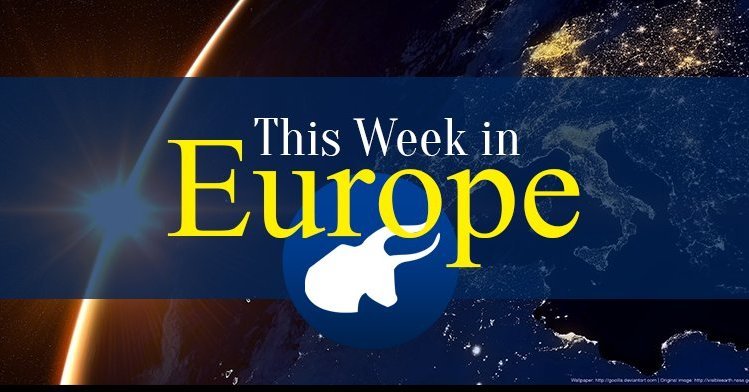Russian aggression in Ukraine
Last Sunday, Russia seized Ukrainian military vessels close to the port of Mariupol in the Azov Sea. Just as European leaders were returning home from the Brexit summit in Brussels, Russian warships opened fire on the Ukrainians, wounding six sailors before boarding the ships and capturing 23 people. The Russian attack involved attack helicopters and fighter jets and concluded with a blockade for commercial shipping in the Kerch Strait, which connects the Azov and the Black seas. The events represent the most recent flare-up of the 2014-born conflict in Ukraine between Russian-backed separatists and actual Russian troops and the Ukrainian military. In response to the attack, Ukraine imposed martial law and banned all Russian men aged 16 to 60 from passing into the country. At the same time, Ukraine will be deploying more units along its border with Russia and Crimea.
EU’s bid for a UNSC seat
On Wednesday, German Finance Minister Olaf Scholz proposed that France, the only EU country with such a seat after Brexit, transform its permanent seat on the United Nations Security Council into an EU one, giving a stronger voice to the Union on the world stage. Scholz also proposed that France could become EU’s permanent ambassador to the UN in order to compensate for the UNSC seat. Ever since 1945, the Security Council has 5 permanent members - Britain, China, Russia, and the United States, aside from France. 10 other non-permanent members have 2-year periods of membership to the council, out of the 193 member-states of the United Nations.
Norwegian minister allegedly sexually abused asylum seekers
On Wednesday, it was revealed that the former Conservative Norwegian fisheries minister between 2001 and 2005, Svein Ludvigsen, began the abuse in 2011, while being regional governor of a northern part of Norway. He has been charged with sexually abusing 3 asylum seekers while in a position of power, offering them housing and residence permits in exchange for their silence. The asylum seekers were much younger than the 72-year-old former minister, and one of them has a mild mental disability. The abuse allegedly took place in his house, hotel rooms and a government office, as reported by POLITICO.
Switzerland rejects “Swiss-law first” initiative
Last Sunday, the Swiss voters rejected a proposal that would have asserted the precedence of Swiss laws over international laws. Two thirds of the voters said no to the referendum called by the country’s right-wing People’S Party (SVP), which argued that the proposal would have strengthened Swiss identity and autonomy. A positive result would have started a conflict between Switzerland, on one side, and the EU and the UN on another - not to mention that 6 UN agencies are based in Geneva.
“Yellow Vests” protest in France and Belgium turns violent
On Friday, the French-inspired Yellow Vests (gilets jaunes) movement protested in the Belgian capital. Protesters attacked police vans and blocked streets in the EU quarter of Brussels, while the police used water cannons to disperse the crowds. Some 60 people were arrested for carrying weapons. One police van was set on fire and another was laid on its side very close to the location of several EU institutions.
The protesters were wearing the high-visibility yellow vests worn by demonstrators in France who have been protesting against a planned rise in the gasoline tax. Apparently a leaderless grass-roots movement, the Yellow Jackets have rocked the French political establishment, while Belgian protesters said they feel solidarity to the French and anger at the general cost of living. High taxes and economic inequality have motivated people to protest, some saying that the salaries of “the elites” should be reduced.
Senior Bulgarian politicians in corruption scandal
Deputy Prime Minister Krassimir Karakachanov, Foreign Minister Ekaterina Zaharieva and Bulgarian MEP Andrey Kovatchev have all been accused of being involved in illegally selling Bulgarian passports to foreigners. Whisteblower Katya Mateva made the allegations as part of the exposing of the illegal scheme and claims she was fired in 2016 for refusing to take part. The head of the agency for Bulgarians abroad and the chief secretary have been arrested in connection with the scheme that is estimated to have involved at least hundreds of thousands of euros.
Yanis Varoufakis to run for European Elections... in Germany
The former Greek Finance Minister Yanis Varoufakis, who clashed repeatedly with the German government over austerity policies at the height of the eurozone crisis, is going to run as a candidate for the European Elections in Germany. He will be standing as a member of DiEM25 (Democracy in Europe Movement), a left-wing alliance of European parties that aims to work against austerity policies and to promote greater European democracy. Varoufakis stated that his candidacy was representative of the kind of pan-European politics that was needed for Europe to move forward and that austerity policies had harmed citizens everywhere, including in Germany.
Kosovo-Albania summit raises tensions with Serbia
As part of a joint session between the governments of Albania and Kosovo, Albania supported the 100% tariff that Kosovo has imposed on Serbian goods. Kosovo argues that this is in response to attempts by Serbia to undermine Kosovo. Both Serbia and the EU have criticised the measure. Albania meanwhile put forward the idea that there should be a total trade barrier between Serbia and Kosovo combined with totally open trade between Albania and Kosovo. From here Albania’s Prime Minister raised the prospect of ‘Albanian union’.
The idea of ‘Greater Albania’, a nationalist Albanian ideal, is a serious problem in the region and the prospect of such a union would worsen relations with Serbia even further. Kosovo was a Serbian province with a majority Albanian population that broke away and unilaterally declared independence. It has been able to receive recognition of statehood from the international community, in large part because of Serbia’s objections. The EU and US have warned Albania against inflaming tensions in one of the most fractured areas of the world.
Latvian populist to attempt to form government
Latvia’s President has nominated Aldis Gobzems, of the populist KPV LV party, to try to form a new government after elections that gave a mixed result. KPV LV (which means ‘who owns the state?’) came second behind the pro-Russian Harmony party. Latvian politics is still very wary of Russian influence and so parties have traditionally tried to block Harmony from participating in any government. Gobzems has followed in this tradition and declared that he had ruled out any coalition with Harmony. However, finding the right partners will be difficult and Jānis Bordāns of the New Conservative Party already failed to form a government earlier this month.


Follow the comments: |
|
